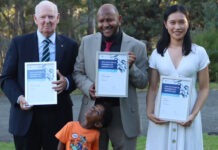University lecturer, community pharmacist and PSA NSW Branch Vice-President Dr Sarah Dineen-Griffin MPS has packed a lot into her 16 years in pharmacy – and she shows no sign of slowing down.
Was pharmacy always your goal?
Short answer: yes! I started working in community pharmacy at age 15 and met some brilliant people. I saw pharmacy as exciting and constantly evolving. Pharmacists directly impact patient health outcomes and I wanted to help people.
Where has pharmacy taken you?
I’ve worked in many professional settings, including as a professional services pharmacist and managing different pharmacies. I also gained accreditation as a consultant pharmacist and started undertaking Home Medicines Reviews. Completing my PhD in 2020 opened doors to international research groups and to present at international conferences. Over 9 months I explored health systems, community pharmacy services and international pharmacy models in the United Kingdom and Europe for my PhD and have been a university lecturer and researcher for the past 2 years.
What are your hopes for your research?
My vision is to achieve evidence-based change in pharmacy practice. Community pharmacy must increasingly be part of primary care, including closer collaboration with medical practitioners, state and federal governments and PHNs – that’s where the future lies. My research focuses on three important, interconnected areas. Pharmacists constantly manage minor ailments, but we see patients seek care from emergency departments or general practice, which is more costly to the health system.
We should work with all stakeholders to reduce this burden.Then there’s self-care, which is becoming increasingly important. We should educate pharmacists on how to teach people the skills to look after themselves and their families. Finally, health and digital literacy are vital – where individuals have the skills and knowledge to access, understand and use information to make important decisions about medicines and health.
‘[On the National Medicines Policy Review Expert Advisory Committee] my role is to ensure the views of younger healthcare professionals (the future voice) are heard.’
You recently had your first child – what have you learnt about navigating a career and family?
I’ve gained a greater understanding of the barriers for women with family and child-rearing responsibilities to progress into and maintain pharmacy leadership positions. Women are 63% of the Australian pharmacist workforce. We need a deeper understanding of the challenges women in pharmacy might face at critical points in their career and life, and find solutions. And we need a strategic plan to support women (and men) to re-enter the profession – in work and leadership positions – after a birth. We should promote a workplace culture where it is more comfortable for conversations with employers about starting a family or taking breastfeeding breaks.
Tell us about your role on the National Medicines Policy (NMP) Review Expert Advisory Committee.
There have been substantial changes in the health landscape since the NMP was published in 2000. My role is to ensure the views of younger healthcare professionals (the future voice) are considered following extensive consultation with key stakeholders including PSA, the AMA, the pharmaceutical industry, consumer organisations, and others. A draft policy is being prepared so the refreshed NMP, as a high-level policy framework, will ensure health system changes are addressed.
It’s important the future needs of the health system are covered. This includes digital technology and interoperability, health providers working to full scope of practice and expansion in treatment options and access avenues, like advances in medical technologies and the potential for repurposing medicines and accessing clinical trials – with a sound implementation process and measurable outcomes.
What advice would you give to early career pharmacists?
Be dynamic, continually upskill and don’t settle. Experience pharmacy in many different roles when you’re starting out, find an area of interest and pursue it. Listen to those around you and model yourself on a mentor. They can introduce you to people, provide support, help you grow and advise you throughout your career. Remember, it’s important to enjoy what you do.



 Professor Margie Danchin[/caption]
Professor Margie Danchin[/caption]

 Dr Peter Tenni[/caption]
Dr Peter Tenni[/caption]
 How should we deprescribe gabapentinoids, according to the Maudsley Deprescribing Guidelines[/caption]
How should we deprescribe gabapentinoids, according to the Maudsley Deprescribing Guidelines[/caption]



 Pharmacists have always prescribed, but they have the potential to prescribe much more
Pharmacists have always prescribed, but they have the potential to prescribe much more






